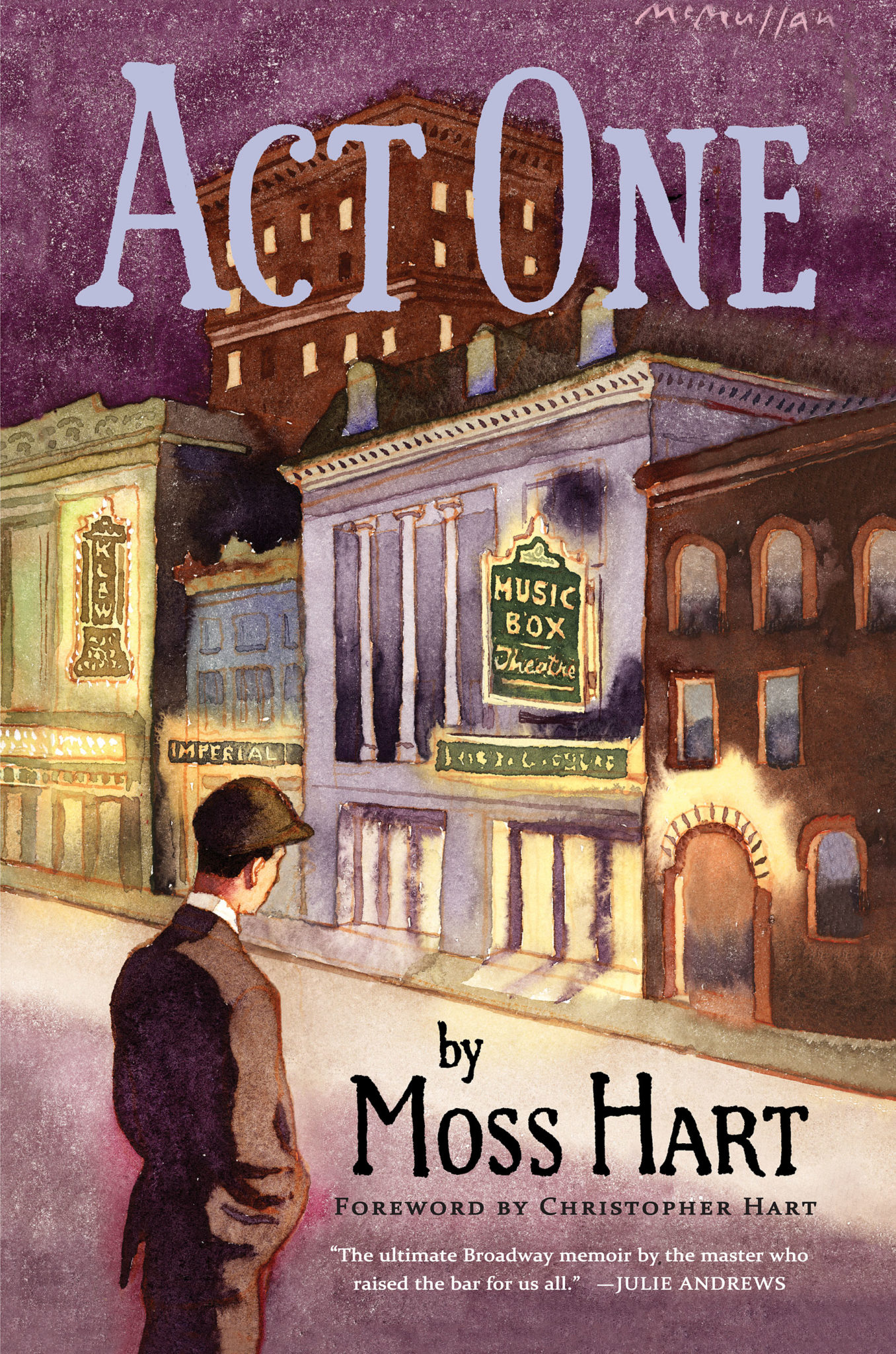Books |
Act One
Moss Hart
By
Published: Mar 02, 2024
Category:
Drama
The best Broadway memoir. Ever.
I’m not the only one who says it.
Here’s André Bishop, Artistic Director of Lincoln Center: “This is the greatest theatrical memoir ever written and it reads like a Dickens novel. I was 12 years old when it first was published—an impressionable age and a perfect age to read about a young man’s dreams of breaking into the theater. Those were Moss Hart’s dreams and they were mine and those of many like me. Act One contains two immortal lines: one at the beginning and one at the end. ‘The theatre is an inevitable refuge of the unhappy child’ starts the book off, and the last line of the book, after the triumphant opening of Moss Hart’s first successful play, comes from an old Broadway pro, who tells the young author, ‘Not bad, kid. Not a bad curtain for a first act.’”
I re-read “Act One” on buses and subways and got smiles and big thumbs up.
I re-read “Act One” in restaurants, and people came over — in New York, at least, it’s a terrific conversation starter.
I re-read it at home and, as I laughed my way through one insanely funny passage, my wife delivered a sentence that could be a blurb: “Hurry up and finish so I can have it.”
Here’s novelist and bookstore owner Ann Patchett: “’Act One’ is one of the best things about owning a bookstore. I can sell ‘Act One’ to people all day long.”
So let me now sell it to you.
Moss Hart was a phenomenally successful playwright — “The Man Who Came to Dinner” and “You Can’t Take it With You,” which won the Pulitzer Prize. As a theater director, he won a Tony award for “My Fair Lady.” He wrote the screenplay for “A Star Is Born.”
“Act One” deals with none of those triumphs.
As its title suggests, it’s about Hart’s childhood, his struggles and his ascent — for me, the most exciting and important times in anyone’s life. [To buy the paperback from Amazon, click here. For the Kindle edition, click here.]
It’s quite an ascent. His parents were poor. His emotional salvation: From a tender age, he was stage-struck. In part, he writes, that’s because “the theater is an inevitable refuge of the unhappy child.” But it’s also because of his Aunt Kate, a Tennessee Williams character who somehow scrimped together the money to take young Moss to the theater.
At 12, swamped with bitterness and shame, he quits school and gets a job that brings in a much-needed $4 a week. But although his feet are “imbedded in the Upper Bronx,” his eyes are set on Broadway.
For two years, he works in a furrier’s storage vault. How would he escape? By walking out, even though he needed a salary. “Character is destiny,” he writes, but it was luck that saves him that day — he walks into a theatrical office just after the office boy quit. At 18, after reading hundreds of plays, he gets an idea for one, writes the script and puts a pseudonym on it. To his delight, it gets produced. But it bombs in tryouts.
Next stop: camps and resorts, where, as social director, he’s expected to stage non-stop entertainment for vacationing New Yorkers. Summer after summer, he treks to the Poconos or the Catskills, loses 20 pounds and returns to New York solvent and bitter. But in those camps, he learns valuable lessons: how to think on his feet, how to push past exhaustion.
He writes another play. It’s terrible. He directs amateur theater groups. And then the bottom: a summer job at the Half Moon Country Club. The owner is so effusive — “Order all the clothes you need, and have them sent” — that he wangles jobs for his father and brother. And off they go to Vermont. No one is waiting for them when they step off the train. The white flannels and blue blazer? Dream on.
The owner spends his days on horseback — perhaps so he can ride away whenever anguished employees approach. Housing? Moss Hart’s shack is known as “Buckingham Palace.” By the time I got to the performance of “Emperor Jones,” I was shaking from laughter. And it gets worse…
The debacle at the Vermont camp teaches Hart a lesson: “Being homeless was not the worst of all possible evils. The real evil was to live on in it, not to fight one’s way out.” He borrows money, saves his family, becomes the “most highly paid, most eagerly sought-after social director of the Borscht Circuit, with a personal staff of 26 people.”
It’s not enough.
We are halfway through the book. Everything so far is prologue. Good stuff. But now we mine the great stuff, the story that will have you turning pages and not checking your email.
Moss Hart writes another play.
It gets noticed. Great names enter the conversation. A collaboration begins with George S. Kaufman, the most successful playwright on Broadway. There are ups and downs and funny moments and horror and… but to say anything is to deny you a story that ends with Kaufman saying one astonishing, heart-stopping sentence.
Hart went on to fame. And such fortune that he’d buy a country house and build additions so obsessively that Alexander Woollcott remarked, “Just what God would have done if He had the money.” That’s Act Two — a story Hart never got to write. No matter. “Act One” is the book you want. The best Broadway memoir. Ever.


